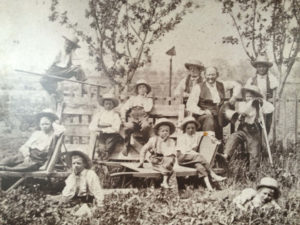Celibacy was one of the main tenets of Shaker belief. Although they did not have children of their own, communities often took in children, both orphans and those who still had family living. Nehemiah’s family lived near Troy, and he remained in contact with them throughout his life. Many of his siblings became Shakers, and his father – though he had not converted – is buried in the row of non-Shakers in the cemetery. At the age of 18, young Shakers could make the decision to stay in the community or go out into the World. Many of them chose to leave, which was unfortunate for the growth of the community: a lot of time and resources were invested into raising the children who would not become

lifelong converts and help sustain the religion. Nehemiah chose to stay, and he remained in Watervliet until his death.
Nehemiah grew and thrived in the community and went on to serve as caretaker of the young boys who were assigned to farm work. Perhaps his own early years influenced his willingness to work with “his boys.” He went into Albany several times to see about bringing more young men into the community. An important part of the agricultural operation was the packaging and selling of seeds. Among the first to develop the garden seed industry, Watervliet Shakers had standardized seed production and used innovative paper packets for selling seeds by 1790. The seed industry quickly achieved great financial success. Under Nehemiah’s careful direction, the young Shaker boys would have helped complete the heavy labor required to cultivate plants used in the seed business while Shaker women and girls gathered and packaged the seeds.
On February 25, 1887, Nehemiah died of dropsy, or edema. His obituary in the Shaker Manifesto read: “He had been a resident of the Society from early childhood and toiled unselfishly for the gospel cause.”








